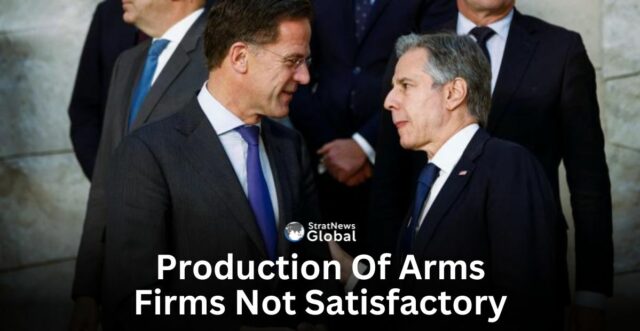
NATO Secretary General Mark Rutte has sharply criticised arms companies inside the U.S.-led alliance, saying they were producing too little and charging too much.
Rutte said that these companies are delivering too slowly as NATO seeks to support Ukraine and boost its defences against Russia.
“We are producing not enough, at too high prices, and delivery is too slow, so defence industry needs to put in more shifts, needs to put in more production lines,” said Rutte who is the former Dutch Prime Minister.
With NATO countries bracing for renewed pressure from U.S. President-elect Donald Trump to raise their defence spending, Rutte also said the current target of two per cent of economic output would not be enough to deter attacks in the future.
Rutte did not say whether he thought three per cent should be the new target, as Trump has insisted.
However, he said NATO would not only have to spend more on defence but also get better value.
“We cannot have a situation where we just pay more for the same and we see large kickbacks to the shareholders,” said Rutt.
The NATO Chief made these observations while talking to reporters after a two-day meeting of NATO foreign ministers at alliance headquarters in Brussels.
Rutte said some NATO countries were turning to South Korean arms firms because “our own defence companies are not producing at the rate we need”.
Countries across the transatlantic military alliance have increased defence spending substantially in recent years, especially following Russia’s February 2022 invasion of Ukraine.
NATO estimates 23 of its 32 members will meet its goal of spending two per cent of GDP on defence this year – up from only three countries who met the target when it was set in 2014.
“I believe strongly – and I know many other allies believe strongly – that two per cent is simply not enough. It is simply not enough if longer term, we want to keep our deterrence at the level that it is now,” Rutte said.
” Now it is okay and we can now defend ourselves, and nobody should try to attack us. But I want that to stay the same in four or five years,” he added.
(With inputs from Reuters)
Delhi based journalist pickled in journalism. Have reported from nine world capitals and almost all parts of India. Over the last three decades, I have worked for India’s mainstream English dailies and contributed to All India Radio, Doordarshan and Women’s Feature Service. Also worked for international media including Japan’s leading newspaper, The Asahi Shimbun and done assignments for The Sunday Times, London, The Telegraph, The Guardian and the Canadian Broadcasting Corporation. Worked in the Embassy of France in New Delhi and can speak French to save my life. Write on Diplomacy, Politics and the social sector. Love Nature, heritage, Nature, animals and vintage cars. Enjoy cycling and playing badminton.




